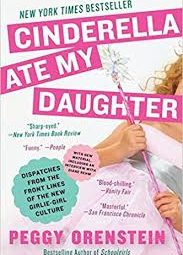

Instead, Orenstein finds that during a drawing exercise at her daughter’s preschool, boys imagined themselves as everything from animals to insects, snack foods to superheroes, while girls were uniformly princesses, fairies, butterflies, or ballerinas. The exec suggests that Disney princess props allow girls to expand their imaginations.

She interviews the Disney exec responsible for the birth of the Disney Princess concept that, 10 years later, has landed some permutation of Ariel, Cinderella, Sleeping Beauty, or Belle in every American household containing a girl-child between the ages of 2 and 10. There’s real pleasure to be derived from reading Orenstein’s sane and reasoned dissection of this phenomenon.


 0 kommentar(er)
0 kommentar(er)
